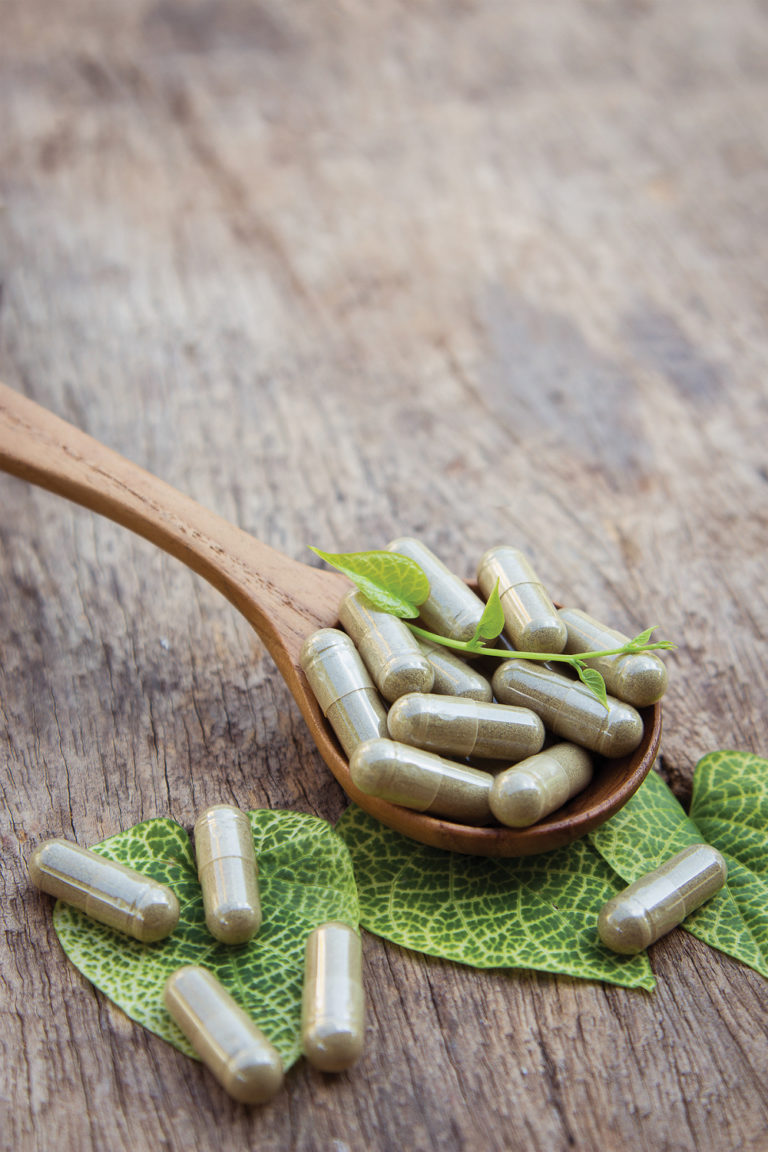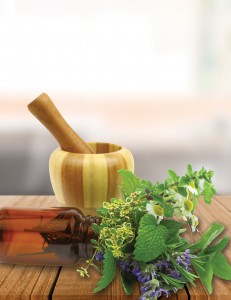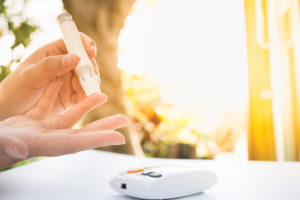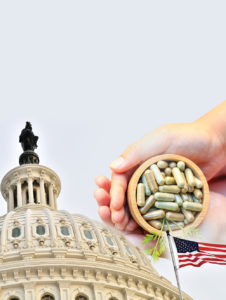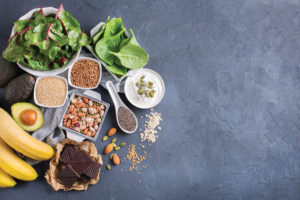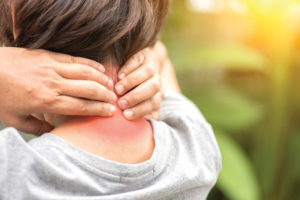All-natural and clean supplements for health promotion galvanize the perception of botanicals—and here’s how experts believe the market will fare in 2018.
Kingdoms are colliding and enmeshing, symbiotically imbuing one another with physical influence once again.
Thousands of members of the plant kingdom influence the animal kingdom—herbs for human health are now an idea whose time has become embraced once again. Distant ancestors began to rely on their native plants to ease physiological insults and aging issues, a practice that fell out of favor when patent medicines gave way to synthetic tools based on allopathy.
But a shift has taken place that mirrors the ways of our ancestors worldwide—botanicals as a tool for health and wellness have re-emerged more strongly during the past 10 to 15 years. And with each passing year, more consumers are actively pursuing self-education and wellness management with the plant kingdom; and researchers are giving them—and brand marketers—tremendous scientific incentive to continue this practice. According to American Botanical Council (ABC) journal HerbalGram’s annual herb market report, total sales of herbal dietary supplements were approximately $7.5 billion in 2016, and this figure is expected to increase to about $8 billion in 2017. According to SPINS and IRI, mainstream/mass market botanical supplement sales neared $944 million in 2016.
“Consumers are getting savvy and want organic, sustainable herbs,” said Jessica Bedi, medical writer, RU Ved, Washington. Retailers should be ready for more consumers to ask more detailed questions about the origins and quality of herbal supplements than they have done in the past. “Additionally, labels can be confusing to interpret. Retailers may find that many consumers may encounter difficulty in understanding the botanical labels; so prioritizing botanical supplement education will go a long way to lessening this challenge,” Bedi believes will continue.
Beth Lambert, CEO of New Jersey-based Herbalist & Alchemist, observed that online sales continue to challenge independent health food retailers, as more consumers shop online. However, she agreed with Bedi, “one advantage these retailers have had every time the marketplace is disrupted is a high level of knowledge and the ability to provide information to customers in the store aisles. This was true when the ‘super-natural’ stores first emerged, and it’s true today.”
Oregon’s Wild Harvest owns and operates Demeter Certified Biodynamic, and organic farms and manufacturers certified more than 150 non-GMO organic, whole herb powders and fresh liquid extracts. According to Co-founder Randy Buresh, RN, Oregon’s Wild Harvest has collaborated with local universities such as Helfgott Institute at the National University of Natural Medicine (NUNM) and Oregon Health Sciences University’s (OHSU) Neurological Department, to provide extracts of echinacea, astragalus, licorice and passionflower for use in clinical studies. For example, the company is currently helping a team at OHSU with the production of a gotu kola product for use in clinical trials.
Herbalist & Alchemist products are formulated by company founder David Winston, RH (AHG), an herbalist, author and educator for nearly 40 years, according to Lambert. He combines the different modalities he has studied—Chinese, American South Eastern and Western Eclectic. The company’s distinction, she said, is the use of spagyric processing for its botanicals. She explained, “Many herbs contain minerals that are a very important part of their activity. For example, minerals play a very significant role in the activity of nettles, alfalfa, raspberry leaf, dandelion leaf, oat straw and fresh oat. Water and especially hydro-alcoholic solutions are very poor methods for extracting minerals. Spagyric processing includes essential nutrients, taking full advantage of the plant’s activity. After the herb is macerated in the extracting liquid (the menstuum), the used herb (or marc) is removed and then burned and reduced to white ash. This white ash is pure minerals and almost all of it is soluble when it is added back into the tincture. This produces the finest, full-spectrum extract available.”
Illinois-based North American Herb and Spice (NAHs) has more than 280 products and, Gray said, is working to establish a social media network and is in the process of a full website redesign which will be launched in the first half of 2018. The new website will be supported by a robust marketing campaign. The website will also include a retailer portal that will provide interactive training and marketing materials.
Behind the scenes, such associations as the ABC is also performing work on ensuring full safety of botanical supplements by exploring sourcing and processing of raw materials and manufacturing to identify potential points of adulteration, which primarily means any substance other than what the label says the herbal product contains.
According to ABC Founder and Executive Director Mark Blumenthal, the ABC-AHP-NCNPR Botanical Adulterants Program, recently re-named ABC-AHP-NCNPR Botanical Adulterants Prevention Program (see sidebar), has grown to include more than 200 underwriters and supporters. Collectively, they encouraged the release in 2017 of six new Botanical Adulterant Bulletins discussing adulteration challenges in cranberry, rhodiola, St. John’s wort, tea tree oil, grapefruit seed extract and saw palmetto. All these herbs are very familiar to millions of health-conscious consumers, so it is essential that industry ensure rigid following of quality control protocols and transparency.
New Products
Adaptogens seem to be taking center stage, as consumers are more aware of why these herbs help maintain overall healthy balance on an individualized level.
“The world has discovered adaptogens,” said Lambert. Winston, author of the book Adaptogens: Herbs for Strength, Stamina & Stress Relief, has expanded the company’s adaptogens line with three new formulas: Calm Adapt—Relaxing Adaptogenic Tonic to Balance Stress—is formulated for people who consider themselves “high strung” and cannot relax easily. It contains calming adaptogens ashwagandha, reishi and schisandra, which calm the shen, relax the body and clear the mind. The nervines fresh oat and linden flowers add support for the nervous system and help to reestablish a healthy mood balance.
Energy Adapt—Stimulating Adaptogenic Tonic to Enhance Vitality is a formula that provides support for individuals who feel a lack of energy or mental clarity. It contains stimulating adaptogens red ginseng, rhodiola and holy basil to support the endocrine and nervous systems as well as immune functions. Its nootropics gotu kola, rosemary and mimosa help improve mood and support cerebral circulation. Maca, said Lambert, when combined with red ginseng and rhodiola, provide support for male and female sexual vitality.
Women’s Adapt—Adaptogenic Tonic for Healthy Sexual Function & Libido is an adaptogenic formula for women who are tired, feel deficient, frequently cold and lacking energy. It contains shatavari and red ginseng to rejuvenate and support female libido as well as endocrine, immune and nervous system function.
Gaia Herbs of North Carolina also expanded its Adrenal Health line with three products. Adrenal Health Daily Support (formerly called Adrenal Health) provides daily nourishment to the adrenal glands. For those who need support while their bodies revitalize and restore at night, Adrenal Health Nightly Restore enables the body to adapt to tension by helping the body to restore and revitalize during the night via supporting adrenal function. And Adrenal Health Jump Start is targeted for those who experience occasional exhaustion and stress, to promote normal energy and stamina.
Ayush/RU Ved recently launched Kuffsoothe, described by Bedi as “a honey-based formulation to soothe irritated throats and cough. Using an ancient formulation to help with congestion, Kuffsoothe offers fast, tasty, and effective relief from aggravated lungs and throats.”
And as probiotics explode on the market, digestive health is a category that has attained tremendous consumer interest. Bitters, noted Lambert, have long been used to support healthy digestion. Herbalist & Alchemist launched three new bitters formulas to its Original Bitters, all of which are available in traditional packaging with droppers as well as a new spray.
Spiced Bitters is a blend of traditional bitters with aromatic spices “that creates an exotic chai-like taste for those favoring an ‘Asian flair’ and contains artichoke, fenugreek, gentian, cinnamon, ginger, orange peel and cardamom,” the company stated. Old World Bitters is a “classic European blend of cooling and warming herbs with a hops flavor note, and contains blessed thistle, elderflower, linden, Roman chamomile, gentian, hops and fenugreek.” Bitter Roots has “earthy and grounding flavor notes for those preferring a hardy bitter,” and contains burdock root, dandelion root, gentian, turmeric, yellow dock and elecampane.
NAHS has launched formulas featuring ingredients such as ashwagandha, black seed oil, and what Gray said is “the only wild turmeric, raw, whole-food organic hemp, and a special high-elevation organic oregano oil (84 percent carvacrol). For the support of pain and inflammatory response, Canacurmin combines wild, high-turmerone, CO2 extract of turmeric with raw CO2 whole food hemp extract and other ingredients such as ginger. This formula provides fast-acting support for muscles and joints,” she noted.
Ashadrene, also new from NAHS, is a proprietary combination of ashwagandha concentrate and royal jelly formulated to support the adrenals and support optimal mood and stamina.
OregaUltra, part of NAHS’ P73 family of products, will be released at Natural Products Expo West in Anaheim, CA. “OregaUltra contains a rare, wild-organic, oregano oil only found in secluded pockets of outcroppings which only occur in the mountains of the Mediterranean at very high elevations of 10,000 to 12,000 feet,” Gray said.
Of course, there are literally hundreds of botanical supplements—single herb, condition-specific formulas, tablets, capsules, shots, chews/gummies and beverages for retailers to offer their community of customers. The best way of trying something new may be to create a “Look what’s new” stage where you group several new items. Put a placard reminding customers to ask a staff member for more information, giving the opportunity to sell. Keep this stage fresh with “new talent.”
At Natural Products Expo West, don’t be skittish to bring in new manufacturers—as long as the product and educational support are there, you can keep current and your customers will continue to rely on you for the latest botanicals they can use to command the success of their wellness. VR
Side-bar 1:
Botanical Adulterants Program Changes Name
The American Botanical Council (ABC, Austin, TX) announced a change in the name of the ABC-AHP-NCNPR Botanical Adulterants Program. The program will be known as the ABC-AHP-NCNPR Botanical Adulterants Prevention Program. ABC and its partners at the American Herbal Pharmacopoeia (AHP) and the National Center for Natural Products Research (NCNPR) at the University of Mississippi decided to add “Prevention” to the name in order to emphasize the purpose and intent of the program.
Initiated in 2010, with its first publications released in 2011, the ABC-AHP-NCNPR Botanical Adulterants Prevention Program (with its new acronym BAPP) has dedicated itself to helping prevent industry use of adulterated raw materials, botanical extracts, and essential oils. This is achieved via the publication of credible and authoritative peer-reviewed documents, interviews with trade media, speeches at industry and professional conferences, and direct consultation with members of the industry.
“The program’s goal has always focused on prevention,” said Mark Blumenthal, founder and executive director of ABC and founder and director of BAPP. “What we’ve been trying to do is alert industry members about specific botanical materials that we have confirmed as being adulterated, and counsel industry on the optimum laboratory analytical methods to help determine authenticity of botanical ingredients. By adding the word ‘Prevention’ to the name, we are making our intention clearer to all stakeholders.”
“The name ‘ABC-AHP-NCNPR Botanical Adulterants Prevention Program’ more accurately reflects the overarching goal of the program,” said Stefan Gafner, PhD, chief science officer of ABC and technical director of BAPP. “Our initiative strives to give members of the herb and dietary supplement industries the necessary tools to avoid being duped by suppliers of ingredients that have been accidentally or purposefully adulterated, so that products on the market are authentic and provide the benefits that consumers expect.”
“In short,” Gafner continued, “we try to prevent adulterated products from reaching the shelves. This is mainly done through dissemination of information about known cases of adulteration and by reviewing analytical test methods to promote the optimal laboratory analytical testing practices for the industry.”
Roy Upton, director of AHP, said, “The addition of ‘Prevention’ to our program’s name gets to the heart of what it is we hope to achieve in doing this work—prevent adulteration from happening both by shining a light on what is happening in the marketplace and by providing the tools needed for companies and quality control personnel to know exactly what to look for.
[End of Side-bar 1]
Side-bar 2:
CBD Clarity
A sub-genre of botanicals that will be growing and which will see a strong influx of questions is CBD, according to Judy Kay Gray, MS, CEO, North American Herb and Spice (NAHS), Illinois. This year will see a targeted focus placed on understanding the laws, and their continual evolution, regarding CBD and its classification as a dietary supplement or controlled substance. “At this time,” she stated, “retailers are understandably unsure of whether the products they are stocking on their shelves are in fact legal.” Although many states have different laws as to the allowable amount of CBD in a product, she noted, retailers nationwide are not aware that these products are now completely legal in all 50 states.
“Because the CBD content in such products, such as our Hempanol, is naturally occurring, customers receive the benefit of the CBD along with the full spectrum profile of terpenes. Additionally, Hempanol contains other ingredients that work synergistically with the whole food hemp to create a benefit to the customer which far exceeds those achieved by a mere CBD isolate product,” she described. “The NAHS Hempanol line was the first-to-market whole food hemp complex, which includes the full-spectrum terpene profile and wild oregano P73. Hempanol products utilize various other novel ingredients such as CO2 extracted hops and CO2 extracted chamomile to provide formulations with focused applications and benefits for sleep support, calm and focus, as well as nervous and immune system support.”
[End of Side-bar 2]
For More Information:
Herbalist & Alchemist, www.herbalist-alchemist.com
North American Herb & Spice, www.p-73.com
Oregon’s Wild Harvest, www.owharvest.com
RU Ved, www.ruved.com



